Renewable Energy Framework Development in Developing Countries
VerifiedAdded on 2023/06/11
|13
|3077
|105
Essay
AI Summary
This essay examines the critical role of renewable energy in fostering sustainable development within developing countries. It explores the challenges these nations face in transitioning to renewable energy sources, including poverty, pollution, and over-exploitation of natural resources. The essay highlights the importance of energy access for socioeconomic development and discusses various frameworks, such as the Sustainable Energy for All initiative and the Multi-tier Energy Access Tracking framework, designed to measure and improve energy consumption. Furthermore, it delves into renewable reserve initiatives and policies aimed at promoting renewable energy adoption, emphasizing the need for international collaboration and investment to achieve sustainable energy goals in developing countries. This document is available on Desklib, a platform offering study tools and resources for students.

Running head: ENVIRONMENT AND DEVELOPMENT
Essay on renewable energy in developing countries
Name of the student:
Name of the university:
Author note:
Essay on renewable energy in developing countries
Name of the student:
Name of the university:
Author note:
Paraphrase This Document
Need a fresh take? Get an instant paraphrase of this document with our AI Paraphraser
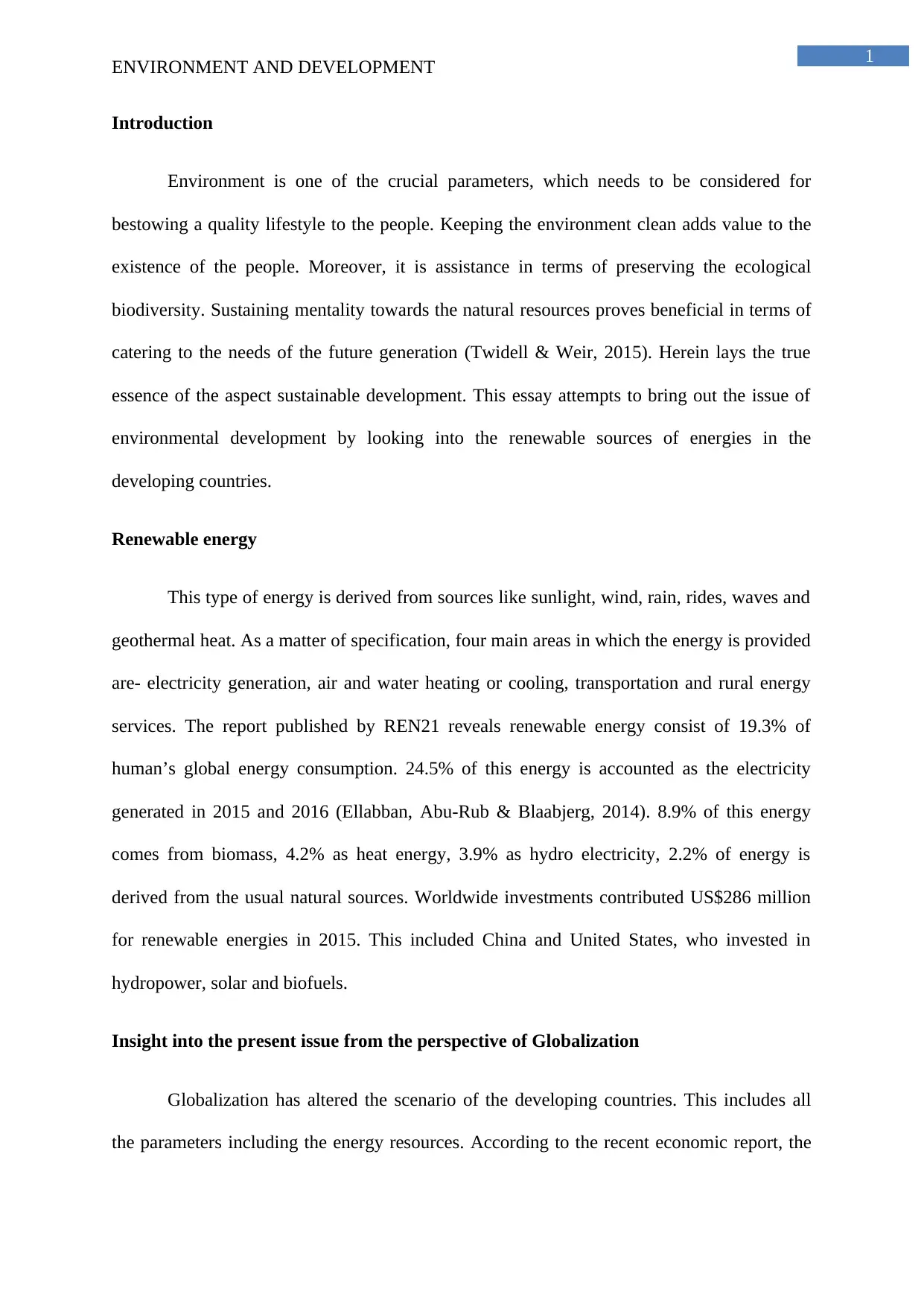
1
ENVIRONMENT AND DEVELOPMENT
Introduction
Environment is one of the crucial parameters, which needs to be considered for
bestowing a quality lifestyle to the people. Keeping the environment clean adds value to the
existence of the people. Moreover, it is assistance in terms of preserving the ecological
biodiversity. Sustaining mentality towards the natural resources proves beneficial in terms of
catering to the needs of the future generation (Twidell & Weir, 2015). Herein lays the true
essence of the aspect sustainable development. This essay attempts to bring out the issue of
environmental development by looking into the renewable sources of energies in the
developing countries.
Renewable energy
This type of energy is derived from sources like sunlight, wind, rain, rides, waves and
geothermal heat. As a matter of specification, four main areas in which the energy is provided
are- electricity generation, air and water heating or cooling, transportation and rural energy
services. The report published by REN21 reveals renewable energy consist of 19.3% of
human’s global energy consumption. 24.5% of this energy is accounted as the electricity
generated in 2015 and 2016 (Ellabban, Abu-Rub & Blaabjerg, 2014). 8.9% of this energy
comes from biomass, 4.2% as heat energy, 3.9% as hydro electricity, 2.2% of energy is
derived from the usual natural sources. Worldwide investments contributed US$286 million
for renewable energies in 2015. This included China and United States, who invested in
hydropower, solar and biofuels.
Insight into the present issue from the perspective of Globalization
Globalization has altered the scenario of the developing countries. This includes all
the parameters including the energy resources. According to the recent economic report, the
ENVIRONMENT AND DEVELOPMENT
Introduction
Environment is one of the crucial parameters, which needs to be considered for
bestowing a quality lifestyle to the people. Keeping the environment clean adds value to the
existence of the people. Moreover, it is assistance in terms of preserving the ecological
biodiversity. Sustaining mentality towards the natural resources proves beneficial in terms of
catering to the needs of the future generation (Twidell & Weir, 2015). Herein lays the true
essence of the aspect sustainable development. This essay attempts to bring out the issue of
environmental development by looking into the renewable sources of energies in the
developing countries.
Renewable energy
This type of energy is derived from sources like sunlight, wind, rain, rides, waves and
geothermal heat. As a matter of specification, four main areas in which the energy is provided
are- electricity generation, air and water heating or cooling, transportation and rural energy
services. The report published by REN21 reveals renewable energy consist of 19.3% of
human’s global energy consumption. 24.5% of this energy is accounted as the electricity
generated in 2015 and 2016 (Ellabban, Abu-Rub & Blaabjerg, 2014). 8.9% of this energy
comes from biomass, 4.2% as heat energy, 3.9% as hydro electricity, 2.2% of energy is
derived from the usual natural sources. Worldwide investments contributed US$286 million
for renewable energies in 2015. This included China and United States, who invested in
hydropower, solar and biofuels.
Insight into the present issue from the perspective of Globalization
Globalization has altered the scenario of the developing countries. This includes all
the parameters including the energy resources. According to the recent economic report, the
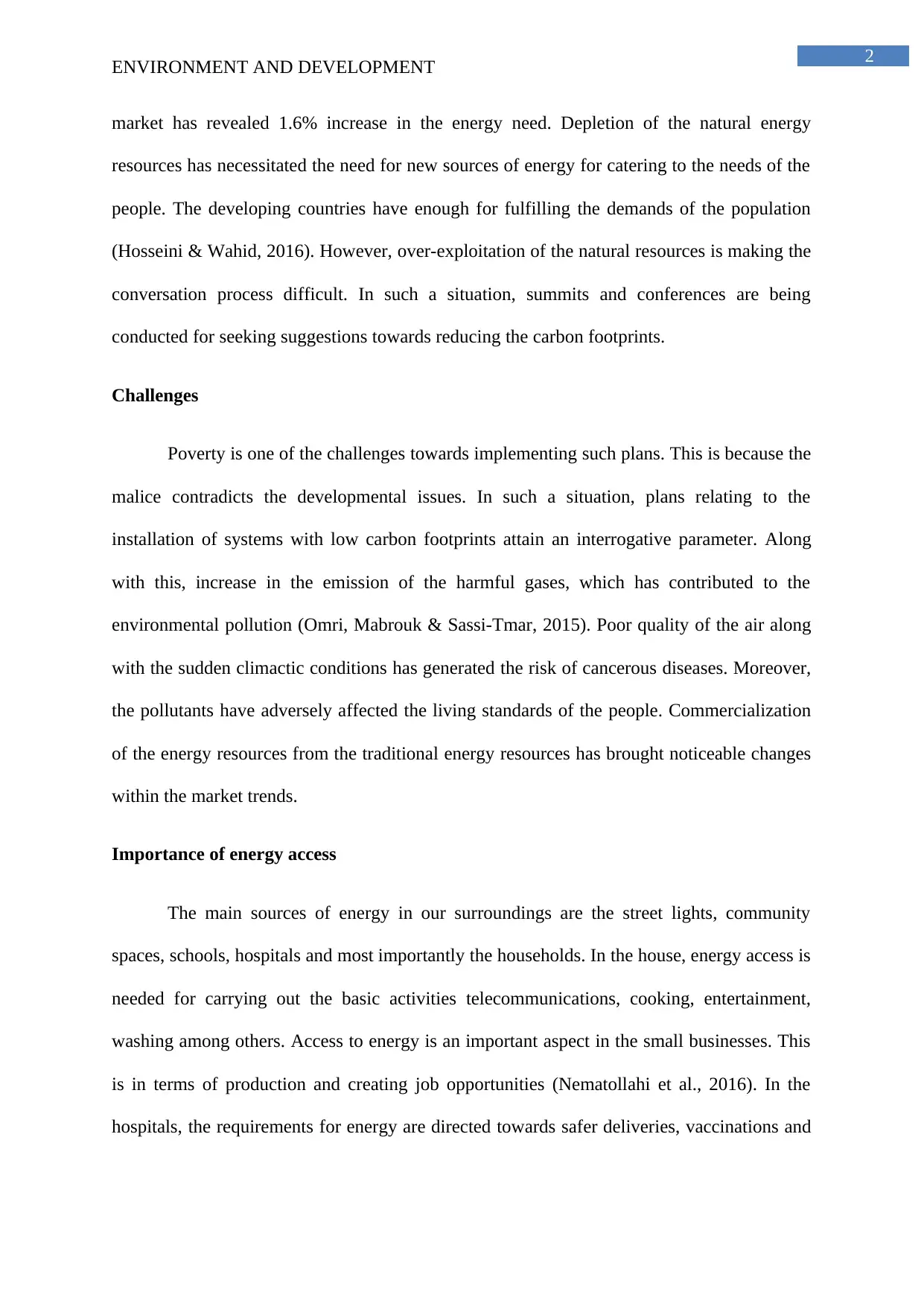
2
ENVIRONMENT AND DEVELOPMENT
market has revealed 1.6% increase in the energy need. Depletion of the natural energy
resources has necessitated the need for new sources of energy for catering to the needs of the
people. The developing countries have enough for fulfilling the demands of the population
(Hosseini & Wahid, 2016). However, over-exploitation of the natural resources is making the
conversation process difficult. In such a situation, summits and conferences are being
conducted for seeking suggestions towards reducing the carbon footprints.
Challenges
Poverty is one of the challenges towards implementing such plans. This is because the
malice contradicts the developmental issues. In such a situation, plans relating to the
installation of systems with low carbon footprints attain an interrogative parameter. Along
with this, increase in the emission of the harmful gases, which has contributed to the
environmental pollution (Omri, Mabrouk & Sassi-Tmar, 2015). Poor quality of the air along
with the sudden climactic conditions has generated the risk of cancerous diseases. Moreover,
the pollutants have adversely affected the living standards of the people. Commercialization
of the energy resources from the traditional energy resources has brought noticeable changes
within the market trends.
Importance of energy access
The main sources of energy in our surroundings are the street lights, community
spaces, schools, hospitals and most importantly the households. In the house, energy access is
needed for carrying out the basic activities telecommunications, cooking, entertainment,
washing among others. Access to energy is an important aspect in the small businesses. This
is in terms of production and creating job opportunities (Nematollahi et al., 2016). In the
hospitals, the requirements for energy are directed towards safer deliveries, vaccinations and
ENVIRONMENT AND DEVELOPMENT
market has revealed 1.6% increase in the energy need. Depletion of the natural energy
resources has necessitated the need for new sources of energy for catering to the needs of the
people. The developing countries have enough for fulfilling the demands of the population
(Hosseini & Wahid, 2016). However, over-exploitation of the natural resources is making the
conversation process difficult. In such a situation, summits and conferences are being
conducted for seeking suggestions towards reducing the carbon footprints.
Challenges
Poverty is one of the challenges towards implementing such plans. This is because the
malice contradicts the developmental issues. In such a situation, plans relating to the
installation of systems with low carbon footprints attain an interrogative parameter. Along
with this, increase in the emission of the harmful gases, which has contributed to the
environmental pollution (Omri, Mabrouk & Sassi-Tmar, 2015). Poor quality of the air along
with the sudden climactic conditions has generated the risk of cancerous diseases. Moreover,
the pollutants have adversely affected the living standards of the people. Commercialization
of the energy resources from the traditional energy resources has brought noticeable changes
within the market trends.
Importance of energy access
The main sources of energy in our surroundings are the street lights, community
spaces, schools, hospitals and most importantly the households. In the house, energy access is
needed for carrying out the basic activities telecommunications, cooking, entertainment,
washing among others. Access to energy is an important aspect in the small businesses. This
is in terms of production and creating job opportunities (Nematollahi et al., 2016). In the
hospitals, the requirements for energy are directed towards safer deliveries, vaccinations and
⊘ This is a preview!⊘
Do you want full access?
Subscribe today to unlock all pages.

Trusted by 1+ million students worldwide
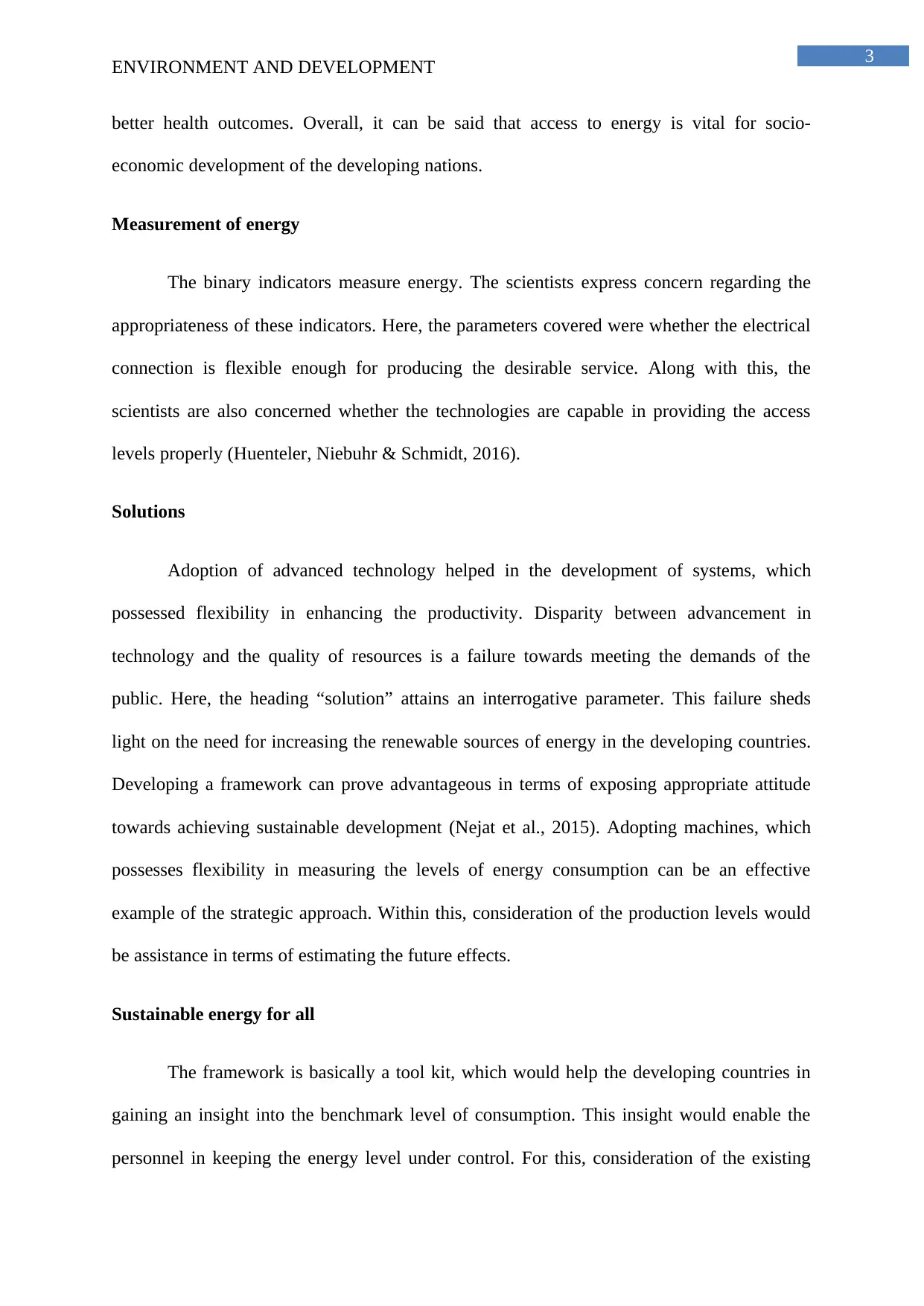
3
ENVIRONMENT AND DEVELOPMENT
better health outcomes. Overall, it can be said that access to energy is vital for socio-
economic development of the developing nations.
Measurement of energy
The binary indicators measure energy. The scientists express concern regarding the
appropriateness of these indicators. Here, the parameters covered were whether the electrical
connection is flexible enough for producing the desirable service. Along with this, the
scientists are also concerned whether the technologies are capable in providing the access
levels properly (Huenteler, Niebuhr & Schmidt, 2016).
Solutions
Adoption of advanced technology helped in the development of systems, which
possessed flexibility in enhancing the productivity. Disparity between advancement in
technology and the quality of resources is a failure towards meeting the demands of the
public. Here, the heading “solution” attains an interrogative parameter. This failure sheds
light on the need for increasing the renewable sources of energy in the developing countries.
Developing a framework can prove advantageous in terms of exposing appropriate attitude
towards achieving sustainable development (Nejat et al., 2015). Adopting machines, which
possesses flexibility in measuring the levels of energy consumption can be an effective
example of the strategic approach. Within this, consideration of the production levels would
be assistance in terms of estimating the future effects.
Sustainable energy for all
The framework is basically a tool kit, which would help the developing countries in
gaining an insight into the benchmark level of consumption. This insight would enable the
personnel in keeping the energy level under control. For this, consideration of the existing
ENVIRONMENT AND DEVELOPMENT
better health outcomes. Overall, it can be said that access to energy is vital for socio-
economic development of the developing nations.
Measurement of energy
The binary indicators measure energy. The scientists express concern regarding the
appropriateness of these indicators. Here, the parameters covered were whether the electrical
connection is flexible enough for producing the desirable service. Along with this, the
scientists are also concerned whether the technologies are capable in providing the access
levels properly (Huenteler, Niebuhr & Schmidt, 2016).
Solutions
Adoption of advanced technology helped in the development of systems, which
possessed flexibility in enhancing the productivity. Disparity between advancement in
technology and the quality of resources is a failure towards meeting the demands of the
public. Here, the heading “solution” attains an interrogative parameter. This failure sheds
light on the need for increasing the renewable sources of energy in the developing countries.
Developing a framework can prove advantageous in terms of exposing appropriate attitude
towards achieving sustainable development (Nejat et al., 2015). Adopting machines, which
possesses flexibility in measuring the levels of energy consumption can be an effective
example of the strategic approach. Within this, consideration of the production levels would
be assistance in terms of estimating the future effects.
Sustainable energy for all
The framework is basically a tool kit, which would help the developing countries in
gaining an insight into the benchmark level of consumption. This insight would enable the
personnel in keeping the energy level under control. For this, consideration of the existing
Paraphrase This Document
Need a fresh take? Get an instant paraphrase of this document with our AI Paraphraser
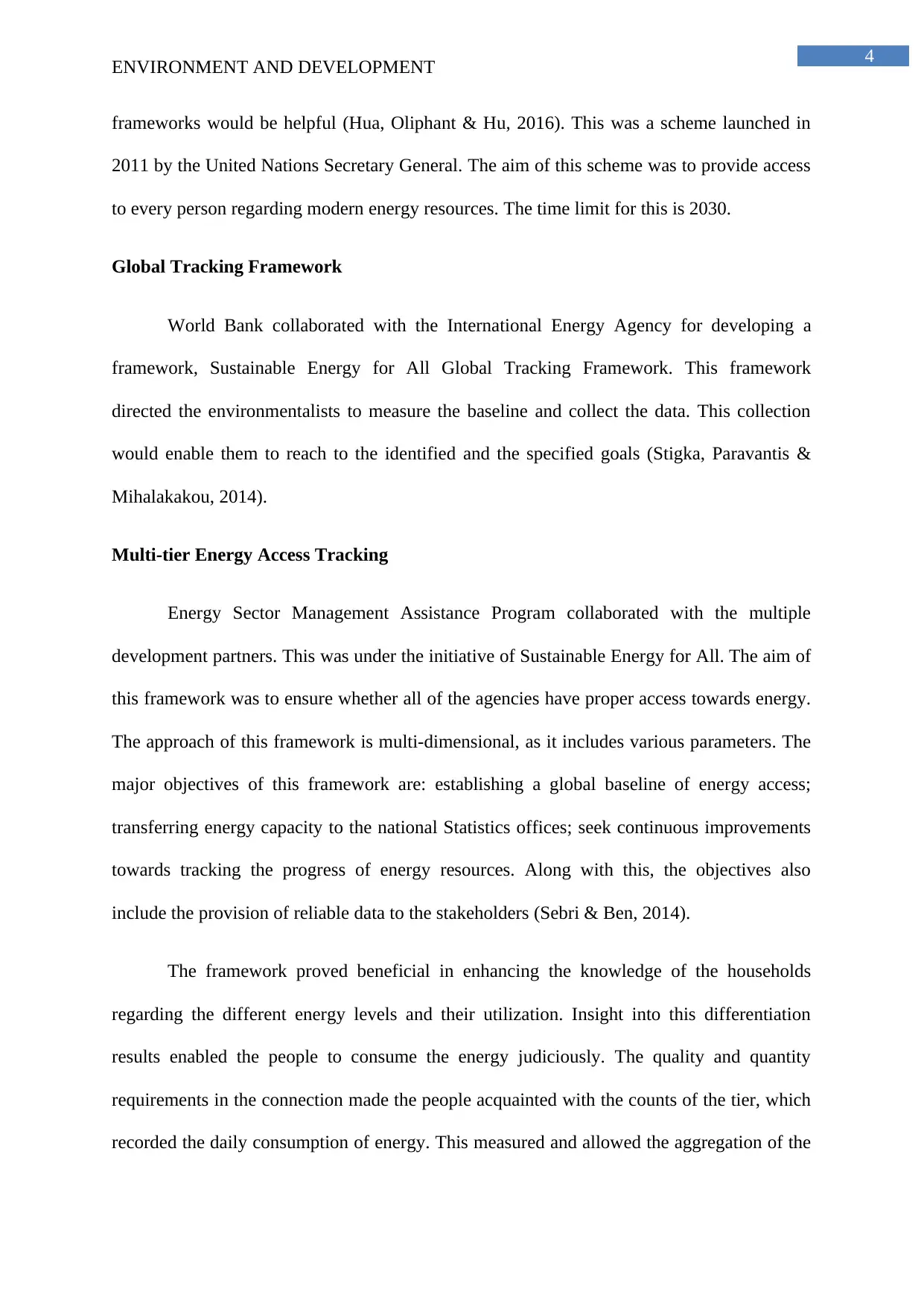
4
ENVIRONMENT AND DEVELOPMENT
frameworks would be helpful (Hua, Oliphant & Hu, 2016). This was a scheme launched in
2011 by the United Nations Secretary General. The aim of this scheme was to provide access
to every person regarding modern energy resources. The time limit for this is 2030.
Global Tracking Framework
World Bank collaborated with the International Energy Agency for developing a
framework, Sustainable Energy for All Global Tracking Framework. This framework
directed the environmentalists to measure the baseline and collect the data. This collection
would enable them to reach to the identified and the specified goals (Stigka, Paravantis &
Mihalakakou, 2014).
Multi-tier Energy Access Tracking
Energy Sector Management Assistance Program collaborated with the multiple
development partners. This was under the initiative of Sustainable Energy for All. The aim of
this framework was to ensure whether all of the agencies have proper access towards energy.
The approach of this framework is multi-dimensional, as it includes various parameters. The
major objectives of this framework are: establishing a global baseline of energy access;
transferring energy capacity to the national Statistics offices; seek continuous improvements
towards tracking the progress of energy resources. Along with this, the objectives also
include the provision of reliable data to the stakeholders (Sebri & Ben, 2014).
The framework proved beneficial in enhancing the knowledge of the households
regarding the different energy levels and their utilization. Insight into this differentiation
results enabled the people to consume the energy judiciously. The quality and quantity
requirements in the connection made the people acquainted with the counts of the tier, which
recorded the daily consumption of energy. This measured and allowed the aggregation of the
ENVIRONMENT AND DEVELOPMENT
frameworks would be helpful (Hua, Oliphant & Hu, 2016). This was a scheme launched in
2011 by the United Nations Secretary General. The aim of this scheme was to provide access
to every person regarding modern energy resources. The time limit for this is 2030.
Global Tracking Framework
World Bank collaborated with the International Energy Agency for developing a
framework, Sustainable Energy for All Global Tracking Framework. This framework
directed the environmentalists to measure the baseline and collect the data. This collection
would enable them to reach to the identified and the specified goals (Stigka, Paravantis &
Mihalakakou, 2014).
Multi-tier Energy Access Tracking
Energy Sector Management Assistance Program collaborated with the multiple
development partners. This was under the initiative of Sustainable Energy for All. The aim of
this framework was to ensure whether all of the agencies have proper access towards energy.
The approach of this framework is multi-dimensional, as it includes various parameters. The
major objectives of this framework are: establishing a global baseline of energy access;
transferring energy capacity to the national Statistics offices; seek continuous improvements
towards tracking the progress of energy resources. Along with this, the objectives also
include the provision of reliable data to the stakeholders (Sebri & Ben, 2014).
The framework proved beneficial in enhancing the knowledge of the households
regarding the different energy levels and their utilization. Insight into this differentiation
results enabled the people to consume the energy judiciously. The quality and quantity
requirements in the connection made the people acquainted with the counts of the tier, which
recorded the daily consumption of energy. This measured and allowed the aggregation of the
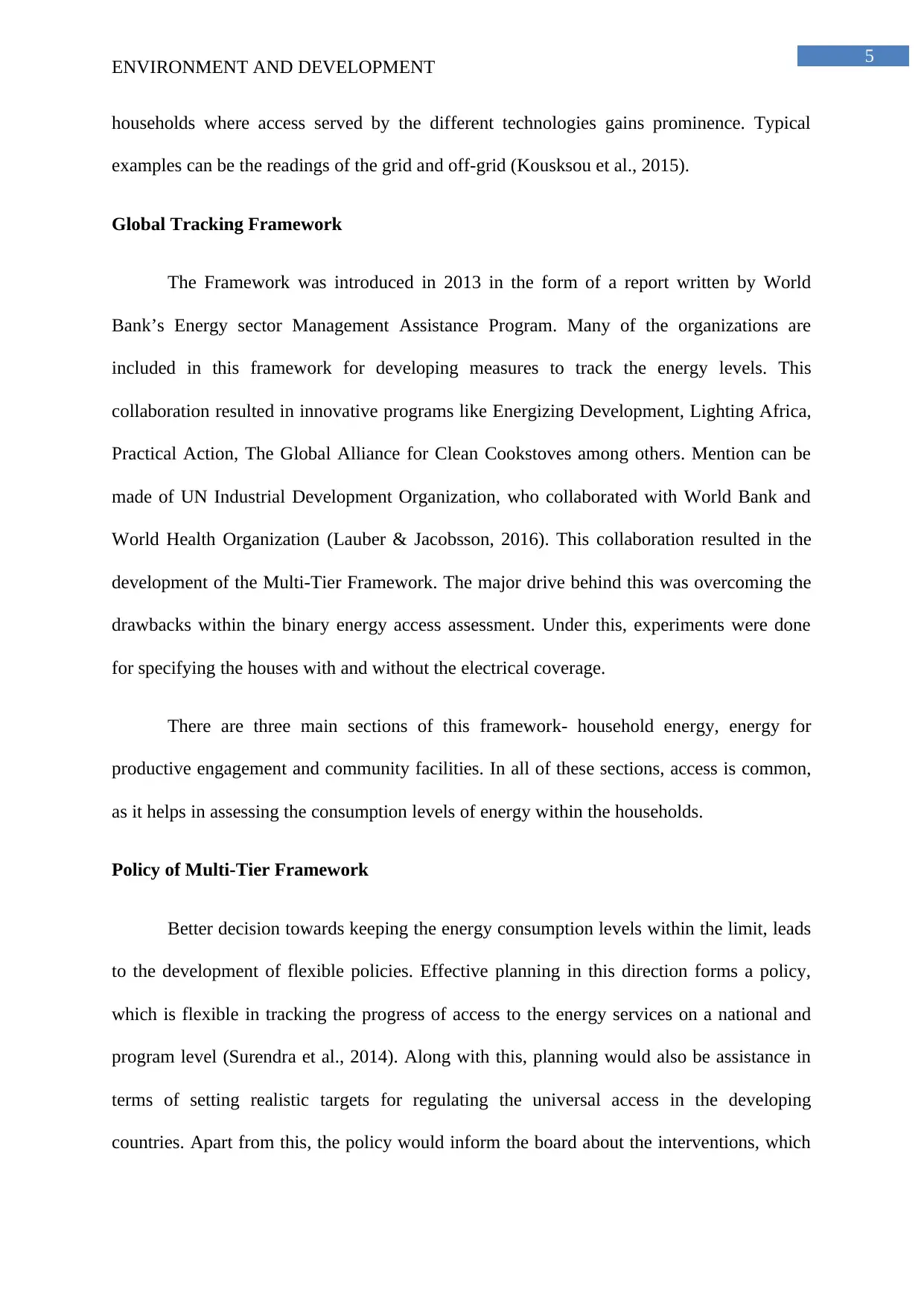
5
ENVIRONMENT AND DEVELOPMENT
households where access served by the different technologies gains prominence. Typical
examples can be the readings of the grid and off-grid (Kousksou et al., 2015).
Global Tracking Framework
The Framework was introduced in 2013 in the form of a report written by World
Bank’s Energy sector Management Assistance Program. Many of the organizations are
included in this framework for developing measures to track the energy levels. This
collaboration resulted in innovative programs like Energizing Development, Lighting Africa,
Practical Action, The Global Alliance for Clean Cookstoves among others. Mention can be
made of UN Industrial Development Organization, who collaborated with World Bank and
World Health Organization (Lauber & Jacobsson, 2016). This collaboration resulted in the
development of the Multi-Tier Framework. The major drive behind this was overcoming the
drawbacks within the binary energy access assessment. Under this, experiments were done
for specifying the houses with and without the electrical coverage.
There are three main sections of this framework- household energy, energy for
productive engagement and community facilities. In all of these sections, access is common,
as it helps in assessing the consumption levels of energy within the households.
Policy of Multi-Tier Framework
Better decision towards keeping the energy consumption levels within the limit, leads
to the development of flexible policies. Effective planning in this direction forms a policy,
which is flexible in tracking the progress of access to the energy services on a national and
program level (Surendra et al., 2014). Along with this, planning would also be assistance in
terms of setting realistic targets for regulating the universal access in the developing
countries. Apart from this, the policy would inform the board about the interventions, which
ENVIRONMENT AND DEVELOPMENT
households where access served by the different technologies gains prominence. Typical
examples can be the readings of the grid and off-grid (Kousksou et al., 2015).
Global Tracking Framework
The Framework was introduced in 2013 in the form of a report written by World
Bank’s Energy sector Management Assistance Program. Many of the organizations are
included in this framework for developing measures to track the energy levels. This
collaboration resulted in innovative programs like Energizing Development, Lighting Africa,
Practical Action, The Global Alliance for Clean Cookstoves among others. Mention can be
made of UN Industrial Development Organization, who collaborated with World Bank and
World Health Organization (Lauber & Jacobsson, 2016). This collaboration resulted in the
development of the Multi-Tier Framework. The major drive behind this was overcoming the
drawbacks within the binary energy access assessment. Under this, experiments were done
for specifying the houses with and without the electrical coverage.
There are three main sections of this framework- household energy, energy for
productive engagement and community facilities. In all of these sections, access is common,
as it helps in assessing the consumption levels of energy within the households.
Policy of Multi-Tier Framework
Better decision towards keeping the energy consumption levels within the limit, leads
to the development of flexible policies. Effective planning in this direction forms a policy,
which is flexible in tracking the progress of access to the energy services on a national and
program level (Surendra et al., 2014). Along with this, planning would also be assistance in
terms of setting realistic targets for regulating the universal access in the developing
countries. Apart from this, the policy would inform the board about the interventions, which
⊘ This is a preview!⊘
Do you want full access?
Subscribe today to unlock all pages.

Trusted by 1+ million students worldwide
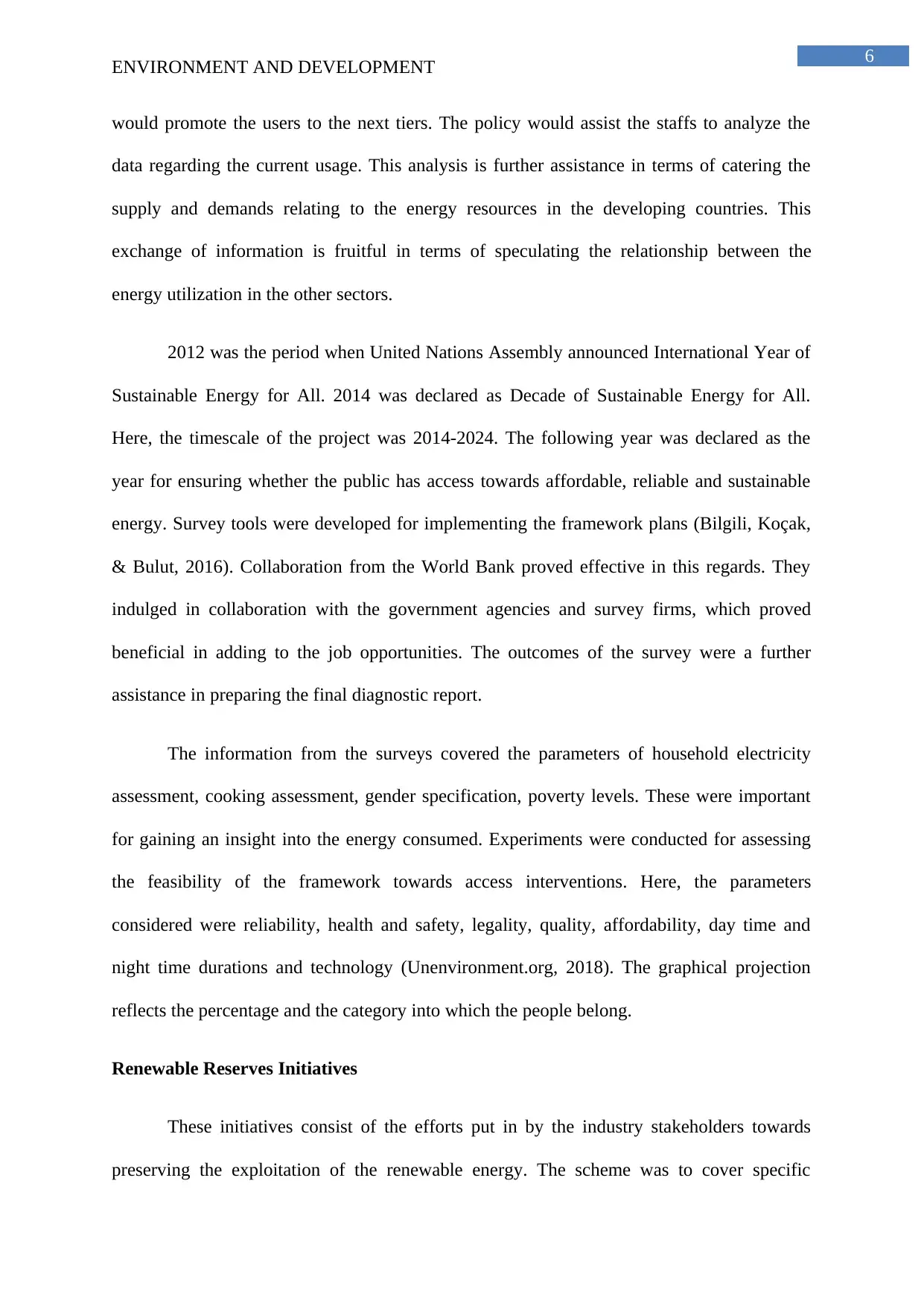
6
ENVIRONMENT AND DEVELOPMENT
would promote the users to the next tiers. The policy would assist the staffs to analyze the
data regarding the current usage. This analysis is further assistance in terms of catering the
supply and demands relating to the energy resources in the developing countries. This
exchange of information is fruitful in terms of speculating the relationship between the
energy utilization in the other sectors.
2012 was the period when United Nations Assembly announced International Year of
Sustainable Energy for All. 2014 was declared as Decade of Sustainable Energy for All.
Here, the timescale of the project was 2014-2024. The following year was declared as the
year for ensuring whether the public has access towards affordable, reliable and sustainable
energy. Survey tools were developed for implementing the framework plans (Bilgili, Koçak,
& Bulut, 2016). Collaboration from the World Bank proved effective in this regards. They
indulged in collaboration with the government agencies and survey firms, which proved
beneficial in adding to the job opportunities. The outcomes of the survey were a further
assistance in preparing the final diagnostic report.
The information from the surveys covered the parameters of household electricity
assessment, cooking assessment, gender specification, poverty levels. These were important
for gaining an insight into the energy consumed. Experiments were conducted for assessing
the feasibility of the framework towards access interventions. Here, the parameters
considered were reliability, health and safety, legality, quality, affordability, day time and
night time durations and technology (Unenvironment.org, 2018). The graphical projection
reflects the percentage and the category into which the people belong.
Renewable Reserves Initiatives
These initiatives consist of the efforts put in by the industry stakeholders towards
preserving the exploitation of the renewable energy. The scheme was to cover specific
ENVIRONMENT AND DEVELOPMENT
would promote the users to the next tiers. The policy would assist the staffs to analyze the
data regarding the current usage. This analysis is further assistance in terms of catering the
supply and demands relating to the energy resources in the developing countries. This
exchange of information is fruitful in terms of speculating the relationship between the
energy utilization in the other sectors.
2012 was the period when United Nations Assembly announced International Year of
Sustainable Energy for All. 2014 was declared as Decade of Sustainable Energy for All.
Here, the timescale of the project was 2014-2024. The following year was declared as the
year for ensuring whether the public has access towards affordable, reliable and sustainable
energy. Survey tools were developed for implementing the framework plans (Bilgili, Koçak,
& Bulut, 2016). Collaboration from the World Bank proved effective in this regards. They
indulged in collaboration with the government agencies and survey firms, which proved
beneficial in adding to the job opportunities. The outcomes of the survey were a further
assistance in preparing the final diagnostic report.
The information from the surveys covered the parameters of household electricity
assessment, cooking assessment, gender specification, poverty levels. These were important
for gaining an insight into the energy consumed. Experiments were conducted for assessing
the feasibility of the framework towards access interventions. Here, the parameters
considered were reliability, health and safety, legality, quality, affordability, day time and
night time durations and technology (Unenvironment.org, 2018). The graphical projection
reflects the percentage and the category into which the people belong.
Renewable Reserves Initiatives
These initiatives consist of the efforts put in by the industry stakeholders towards
preserving the exploitation of the renewable energy. The scheme was to cover specific
Paraphrase This Document
Need a fresh take? Get an instant paraphrase of this document with our AI Paraphraser
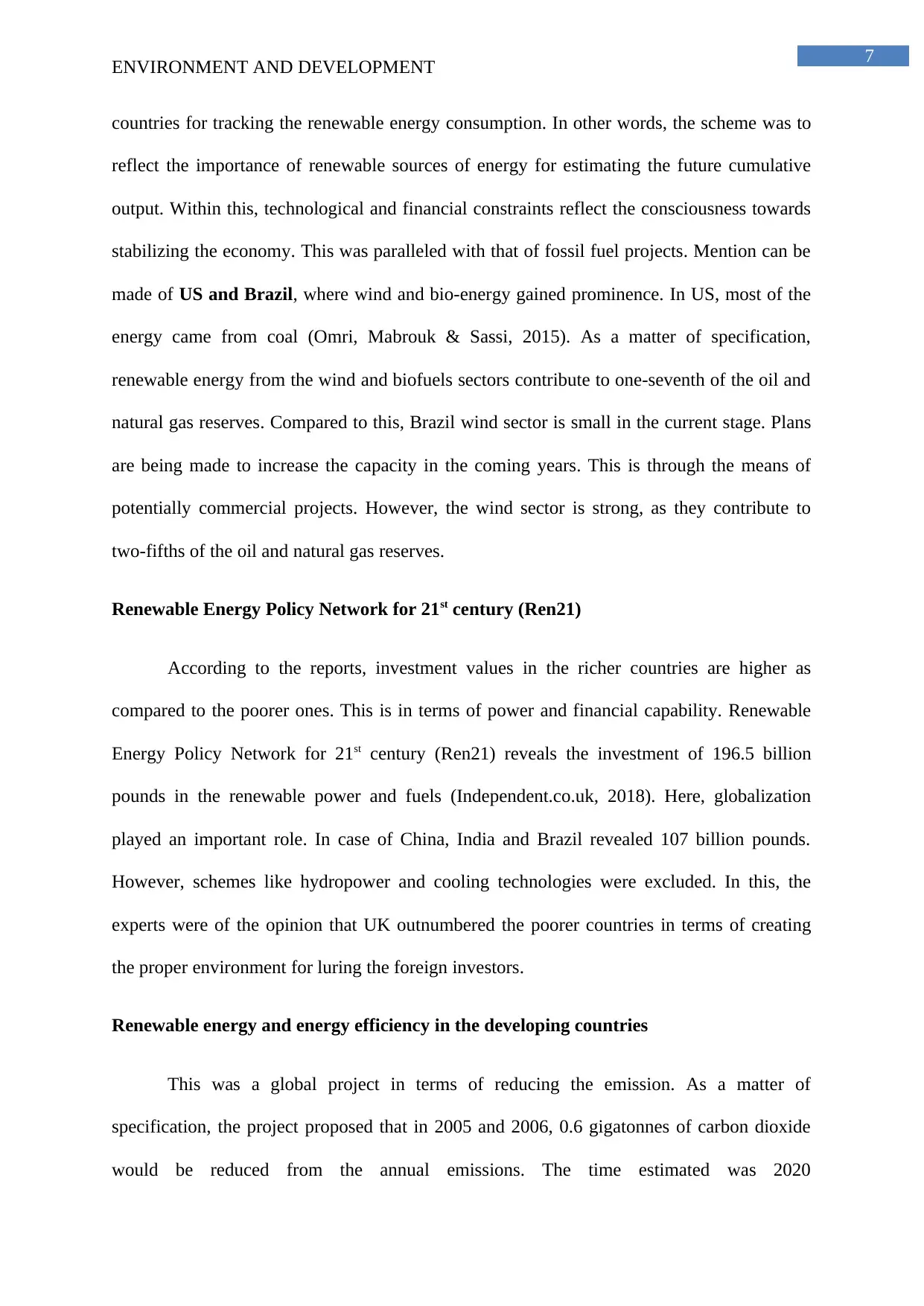
7
ENVIRONMENT AND DEVELOPMENT
countries for tracking the renewable energy consumption. In other words, the scheme was to
reflect the importance of renewable sources of energy for estimating the future cumulative
output. Within this, technological and financial constraints reflect the consciousness towards
stabilizing the economy. This was paralleled with that of fossil fuel projects. Mention can be
made of US and Brazil, where wind and bio-energy gained prominence. In US, most of the
energy came from coal (Omri, Mabrouk & Sassi, 2015). As a matter of specification,
renewable energy from the wind and biofuels sectors contribute to one-seventh of the oil and
natural gas reserves. Compared to this, Brazil wind sector is small in the current stage. Plans
are being made to increase the capacity in the coming years. This is through the means of
potentially commercial projects. However, the wind sector is strong, as they contribute to
two-fifths of the oil and natural gas reserves.
Renewable Energy Policy Network for 21st century (Ren21)
According to the reports, investment values in the richer countries are higher as
compared to the poorer ones. This is in terms of power and financial capability. Renewable
Energy Policy Network for 21st century (Ren21) reveals the investment of 196.5 billion
pounds in the renewable power and fuels (Independent.co.uk, 2018). Here, globalization
played an important role. In case of China, India and Brazil revealed 107 billion pounds.
However, schemes like hydropower and cooling technologies were excluded. In this, the
experts were of the opinion that UK outnumbered the poorer countries in terms of creating
the proper environment for luring the foreign investors.
Renewable energy and energy efficiency in the developing countries
This was a global project in terms of reducing the emission. As a matter of
specification, the project proposed that in 2005 and 2006, 0.6 gigatonnes of carbon dioxide
would be reduced from the annual emissions. The time estimated was 2020
ENVIRONMENT AND DEVELOPMENT
countries for tracking the renewable energy consumption. In other words, the scheme was to
reflect the importance of renewable sources of energy for estimating the future cumulative
output. Within this, technological and financial constraints reflect the consciousness towards
stabilizing the economy. This was paralleled with that of fossil fuel projects. Mention can be
made of US and Brazil, where wind and bio-energy gained prominence. In US, most of the
energy came from coal (Omri, Mabrouk & Sassi, 2015). As a matter of specification,
renewable energy from the wind and biofuels sectors contribute to one-seventh of the oil and
natural gas reserves. Compared to this, Brazil wind sector is small in the current stage. Plans
are being made to increase the capacity in the coming years. This is through the means of
potentially commercial projects. However, the wind sector is strong, as they contribute to
two-fifths of the oil and natural gas reserves.
Renewable Energy Policy Network for 21st century (Ren21)
According to the reports, investment values in the richer countries are higher as
compared to the poorer ones. This is in terms of power and financial capability. Renewable
Energy Policy Network for 21st century (Ren21) reveals the investment of 196.5 billion
pounds in the renewable power and fuels (Independent.co.uk, 2018). Here, globalization
played an important role. In case of China, India and Brazil revealed 107 billion pounds.
However, schemes like hydropower and cooling technologies were excluded. In this, the
experts were of the opinion that UK outnumbered the poorer countries in terms of creating
the proper environment for luring the foreign investors.
Renewable energy and energy efficiency in the developing countries
This was a global project in terms of reducing the emission. As a matter of
specification, the project proposed that in 2005 and 2006, 0.6 gigatonnes of carbon dioxide
would be reduced from the annual emissions. The time estimated was 2020
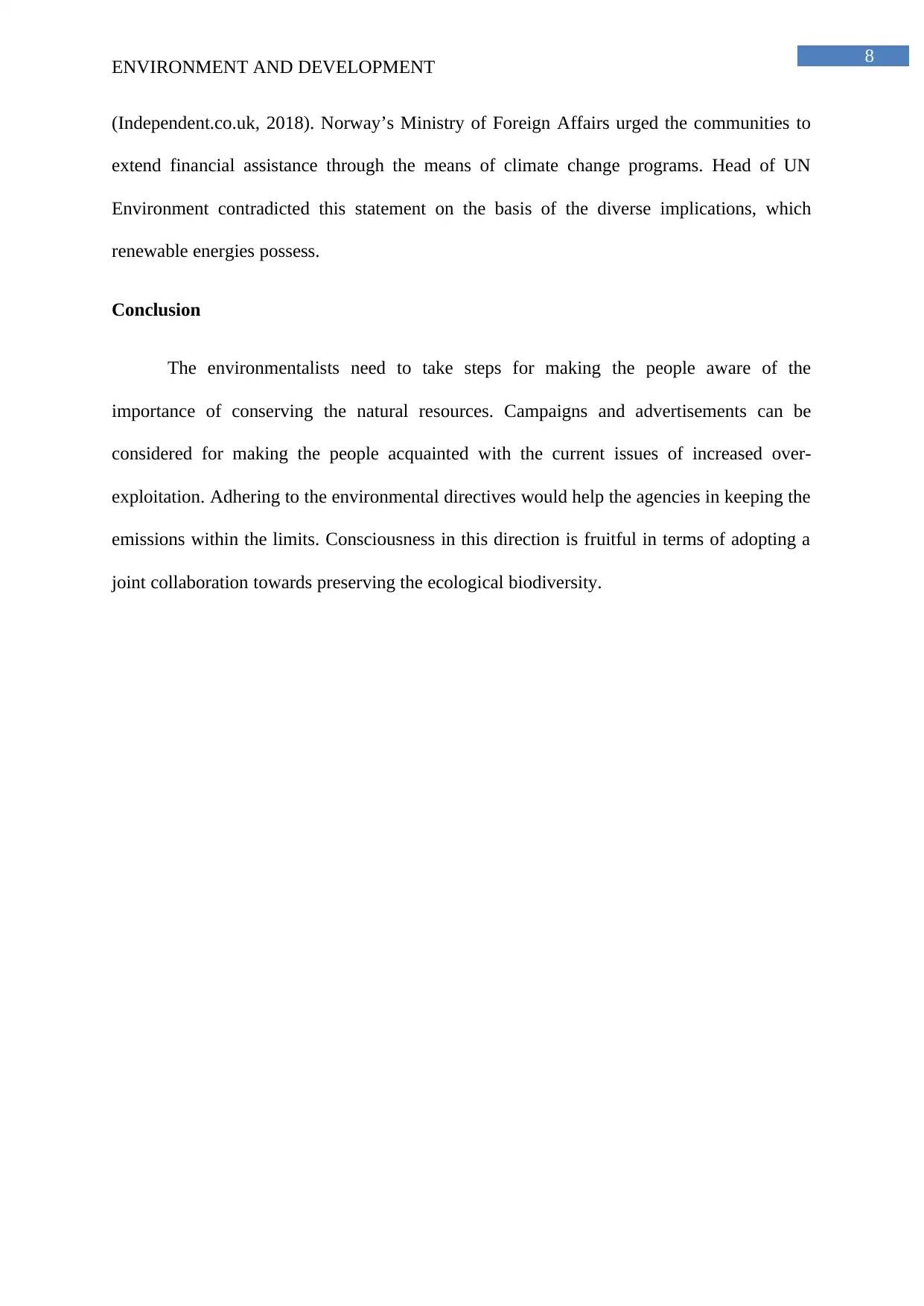
8
ENVIRONMENT AND DEVELOPMENT
(Independent.co.uk, 2018). Norway’s Ministry of Foreign Affairs urged the communities to
extend financial assistance through the means of climate change programs. Head of UN
Environment contradicted this statement on the basis of the diverse implications, which
renewable energies possess.
Conclusion
The environmentalists need to take steps for making the people aware of the
importance of conserving the natural resources. Campaigns and advertisements can be
considered for making the people acquainted with the current issues of increased over-
exploitation. Adhering to the environmental directives would help the agencies in keeping the
emissions within the limits. Consciousness in this direction is fruitful in terms of adopting a
joint collaboration towards preserving the ecological biodiversity.
ENVIRONMENT AND DEVELOPMENT
(Independent.co.uk, 2018). Norway’s Ministry of Foreign Affairs urged the communities to
extend financial assistance through the means of climate change programs. Head of UN
Environment contradicted this statement on the basis of the diverse implications, which
renewable energies possess.
Conclusion
The environmentalists need to take steps for making the people aware of the
importance of conserving the natural resources. Campaigns and advertisements can be
considered for making the people acquainted with the current issues of increased over-
exploitation. Adhering to the environmental directives would help the agencies in keeping the
emissions within the limits. Consciousness in this direction is fruitful in terms of adopting a
joint collaboration towards preserving the ecological biodiversity.
⊘ This is a preview!⊘
Do you want full access?
Subscribe today to unlock all pages.

Trusted by 1+ million students worldwide
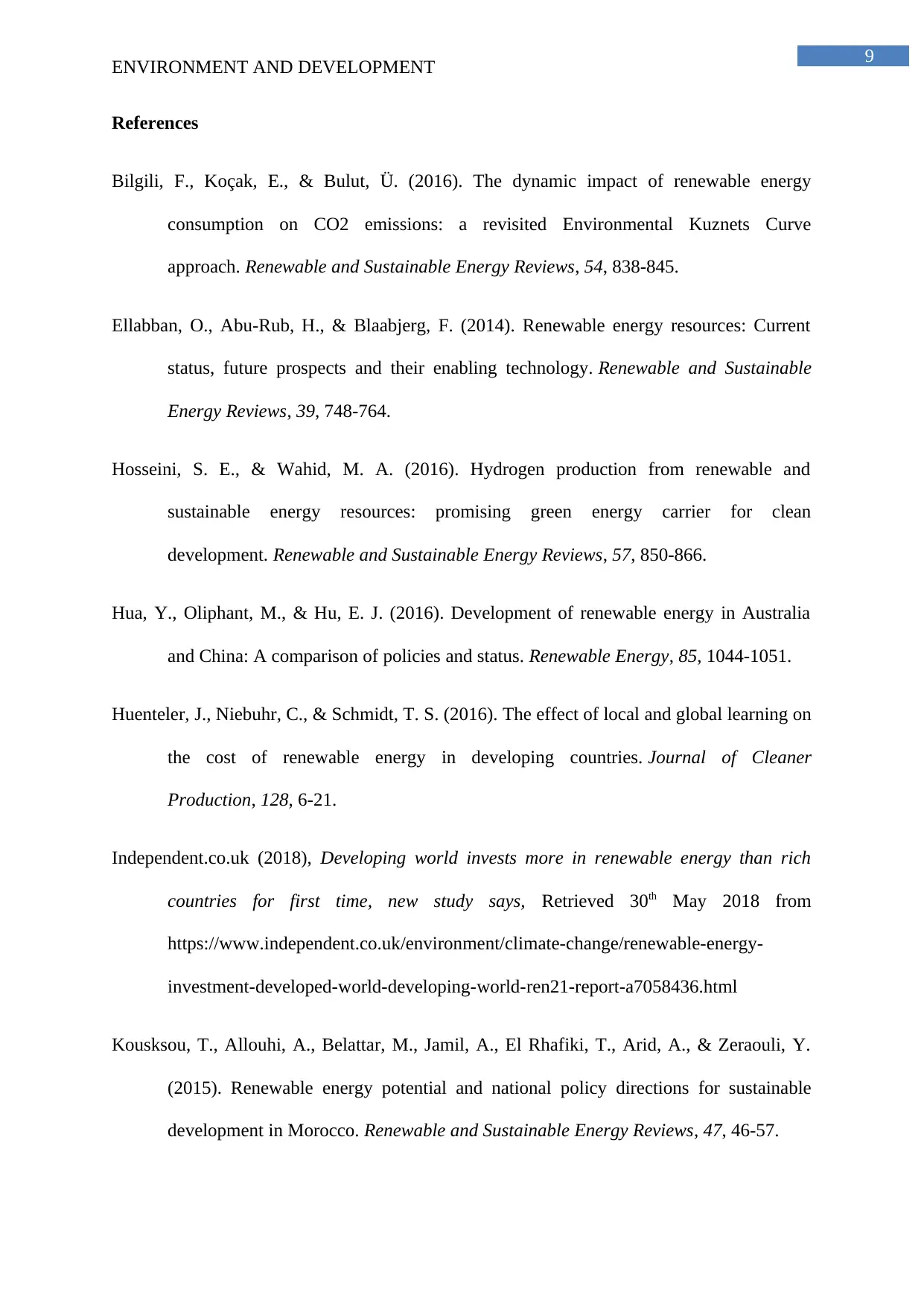
9
ENVIRONMENT AND DEVELOPMENT
References
Bilgili, F., Koçak, E., & Bulut, Ü. (2016). The dynamic impact of renewable energy
consumption on CO2 emissions: a revisited Environmental Kuznets Curve
approach. Renewable and Sustainable Energy Reviews, 54, 838-845.
Ellabban, O., Abu-Rub, H., & Blaabjerg, F. (2014). Renewable energy resources: Current
status, future prospects and their enabling technology. Renewable and Sustainable
Energy Reviews, 39, 748-764.
Hosseini, S. E., & Wahid, M. A. (2016). Hydrogen production from renewable and
sustainable energy resources: promising green energy carrier for clean
development. Renewable and Sustainable Energy Reviews, 57, 850-866.
Hua, Y., Oliphant, M., & Hu, E. J. (2016). Development of renewable energy in Australia
and China: A comparison of policies and status. Renewable Energy, 85, 1044-1051.
Huenteler, J., Niebuhr, C., & Schmidt, T. S. (2016). The effect of local and global learning on
the cost of renewable energy in developing countries. Journal of Cleaner
Production, 128, 6-21.
Independent.co.uk (2018), Developing world invests more in renewable energy than rich
countries for first time, new study says, Retrieved 30th May 2018 from
https://www.independent.co.uk/environment/climate-change/renewable-energy-
investment-developed-world-developing-world-ren21-report-a7058436.html
Kousksou, T., Allouhi, A., Belattar, M., Jamil, A., El Rhafiki, T., Arid, A., & Zeraouli, Y.
(2015). Renewable energy potential and national policy directions for sustainable
development in Morocco. Renewable and Sustainable Energy Reviews, 47, 46-57.
ENVIRONMENT AND DEVELOPMENT
References
Bilgili, F., Koçak, E., & Bulut, Ü. (2016). The dynamic impact of renewable energy
consumption on CO2 emissions: a revisited Environmental Kuznets Curve
approach. Renewable and Sustainable Energy Reviews, 54, 838-845.
Ellabban, O., Abu-Rub, H., & Blaabjerg, F. (2014). Renewable energy resources: Current
status, future prospects and their enabling technology. Renewable and Sustainable
Energy Reviews, 39, 748-764.
Hosseini, S. E., & Wahid, M. A. (2016). Hydrogen production from renewable and
sustainable energy resources: promising green energy carrier for clean
development. Renewable and Sustainable Energy Reviews, 57, 850-866.
Hua, Y., Oliphant, M., & Hu, E. J. (2016). Development of renewable energy in Australia
and China: A comparison of policies and status. Renewable Energy, 85, 1044-1051.
Huenteler, J., Niebuhr, C., & Schmidt, T. S. (2016). The effect of local and global learning on
the cost of renewable energy in developing countries. Journal of Cleaner
Production, 128, 6-21.
Independent.co.uk (2018), Developing world invests more in renewable energy than rich
countries for first time, new study says, Retrieved 30th May 2018 from
https://www.independent.co.uk/environment/climate-change/renewable-energy-
investment-developed-world-developing-world-ren21-report-a7058436.html
Kousksou, T., Allouhi, A., Belattar, M., Jamil, A., El Rhafiki, T., Arid, A., & Zeraouli, Y.
(2015). Renewable energy potential and national policy directions for sustainable
development in Morocco. Renewable and Sustainable Energy Reviews, 47, 46-57.
Paraphrase This Document
Need a fresh take? Get an instant paraphrase of this document with our AI Paraphraser
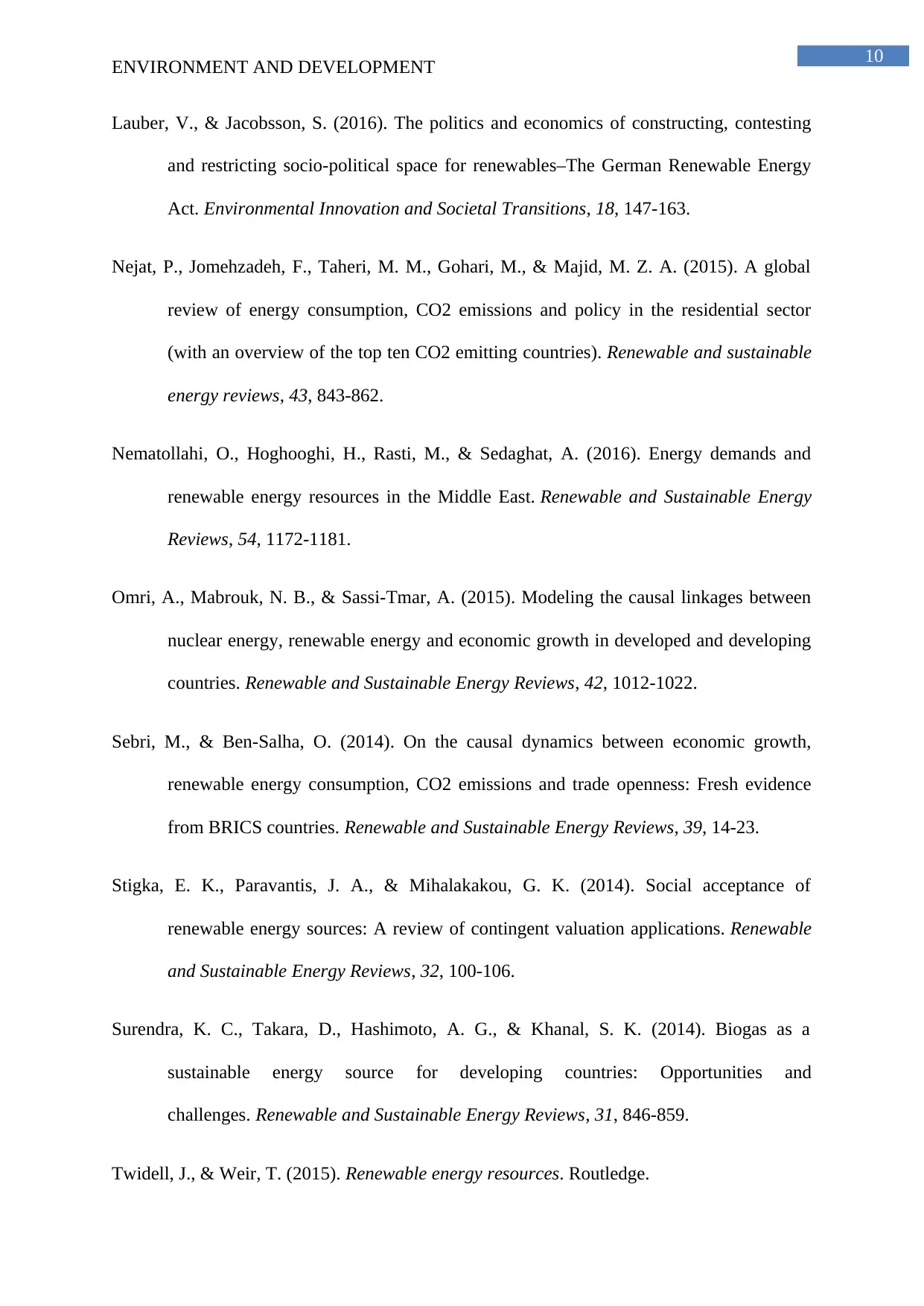
10
ENVIRONMENT AND DEVELOPMENT
Lauber, V., & Jacobsson, S. (2016). The politics and economics of constructing, contesting
and restricting socio-political space for renewables–The German Renewable Energy
Act. Environmental Innovation and Societal Transitions, 18, 147-163.
Nejat, P., Jomehzadeh, F., Taheri, M. M., Gohari, M., & Majid, M. Z. A. (2015). A global
review of energy consumption, CO2 emissions and policy in the residential sector
(with an overview of the top ten CO2 emitting countries). Renewable and sustainable
energy reviews, 43, 843-862.
Nematollahi, O., Hoghooghi, H., Rasti, M., & Sedaghat, A. (2016). Energy demands and
renewable energy resources in the Middle East. Renewable and Sustainable Energy
Reviews, 54, 1172-1181.
Omri, A., Mabrouk, N. B., & Sassi-Tmar, A. (2015). Modeling the causal linkages between
nuclear energy, renewable energy and economic growth in developed and developing
countries. Renewable and Sustainable Energy Reviews, 42, 1012-1022.
Sebri, M., & Ben-Salha, O. (2014). On the causal dynamics between economic growth,
renewable energy consumption, CO2 emissions and trade openness: Fresh evidence
from BRICS countries. Renewable and Sustainable Energy Reviews, 39, 14-23.
Stigka, E. K., Paravantis, J. A., & Mihalakakou, G. K. (2014). Social acceptance of
renewable energy sources: A review of contingent valuation applications. Renewable
and Sustainable Energy Reviews, 32, 100-106.
Surendra, K. C., Takara, D., Hashimoto, A. G., & Khanal, S. K. (2014). Biogas as a
sustainable energy source for developing countries: Opportunities and
challenges. Renewable and Sustainable Energy Reviews, 31, 846-859.
Twidell, J., & Weir, T. (2015). Renewable energy resources. Routledge.
ENVIRONMENT AND DEVELOPMENT
Lauber, V., & Jacobsson, S. (2016). The politics and economics of constructing, contesting
and restricting socio-political space for renewables–The German Renewable Energy
Act. Environmental Innovation and Societal Transitions, 18, 147-163.
Nejat, P., Jomehzadeh, F., Taheri, M. M., Gohari, M., & Majid, M. Z. A. (2015). A global
review of energy consumption, CO2 emissions and policy in the residential sector
(with an overview of the top ten CO2 emitting countries). Renewable and sustainable
energy reviews, 43, 843-862.
Nematollahi, O., Hoghooghi, H., Rasti, M., & Sedaghat, A. (2016). Energy demands and
renewable energy resources in the Middle East. Renewable and Sustainable Energy
Reviews, 54, 1172-1181.
Omri, A., Mabrouk, N. B., & Sassi-Tmar, A. (2015). Modeling the causal linkages between
nuclear energy, renewable energy and economic growth in developed and developing
countries. Renewable and Sustainable Energy Reviews, 42, 1012-1022.
Sebri, M., & Ben-Salha, O. (2014). On the causal dynamics between economic growth,
renewable energy consumption, CO2 emissions and trade openness: Fresh evidence
from BRICS countries. Renewable and Sustainable Energy Reviews, 39, 14-23.
Stigka, E. K., Paravantis, J. A., & Mihalakakou, G. K. (2014). Social acceptance of
renewable energy sources: A review of contingent valuation applications. Renewable
and Sustainable Energy Reviews, 32, 100-106.
Surendra, K. C., Takara, D., Hashimoto, A. G., & Khanal, S. K. (2014). Biogas as a
sustainable energy source for developing countries: Opportunities and
challenges. Renewable and Sustainable Energy Reviews, 31, 846-859.
Twidell, J., & Weir, T. (2015). Renewable energy resources. Routledge.
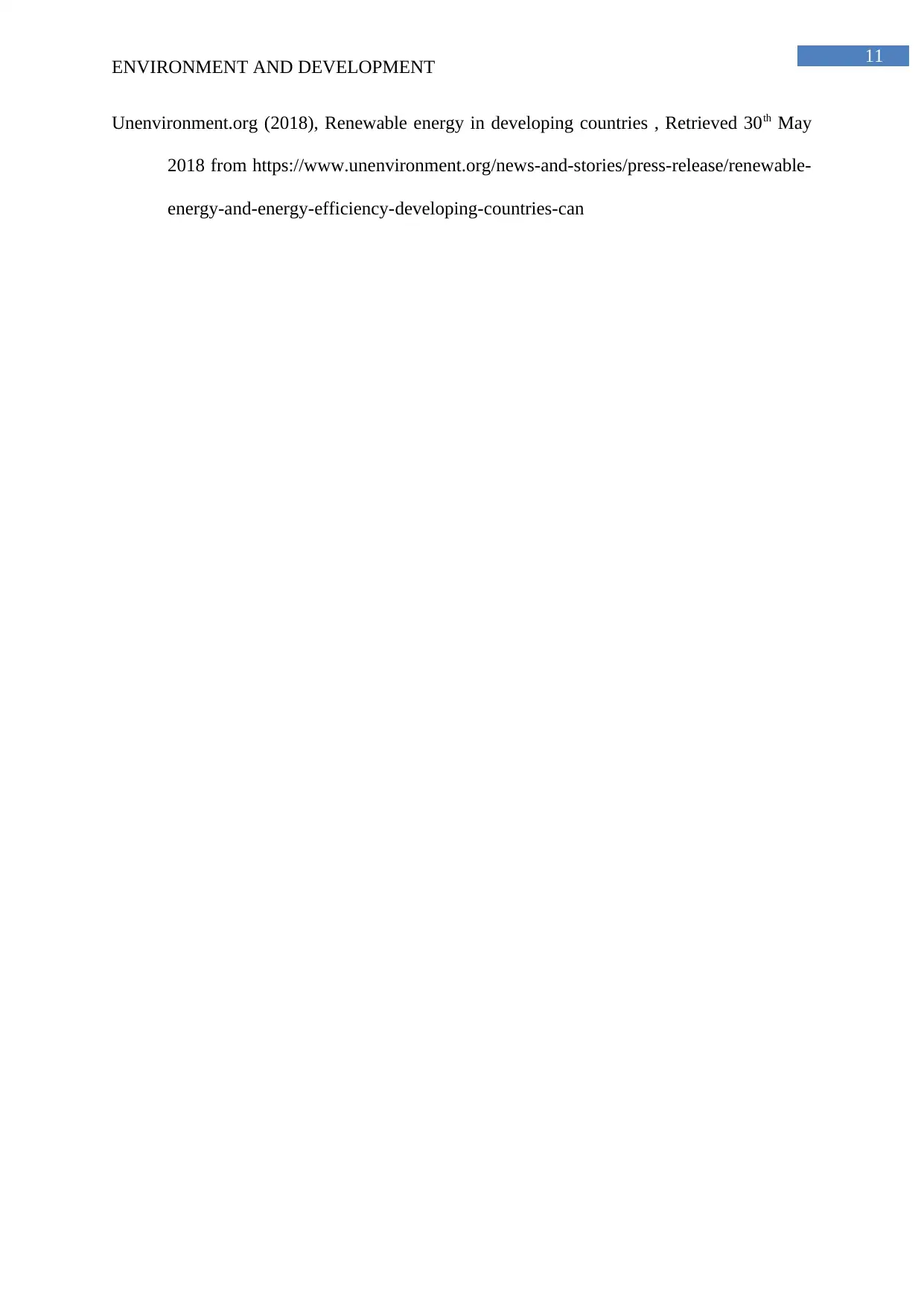
11
ENVIRONMENT AND DEVELOPMENT
Unenvironment.org (2018), Renewable energy in developing countries , Retrieved 30th May
2018 from https://www.unenvironment.org/news-and-stories/press-release/renewable-
energy-and-energy-efficiency-developing-countries-can
ENVIRONMENT AND DEVELOPMENT
Unenvironment.org (2018), Renewable energy in developing countries , Retrieved 30th May
2018 from https://www.unenvironment.org/news-and-stories/press-release/renewable-
energy-and-energy-efficiency-developing-countries-can
⊘ This is a preview!⊘
Do you want full access?
Subscribe today to unlock all pages.

Trusted by 1+ million students worldwide
1 out of 13
Related Documents
Your All-in-One AI-Powered Toolkit for Academic Success.
+13062052269
info@desklib.com
Available 24*7 on WhatsApp / Email
![[object Object]](/_next/static/media/star-bottom.7253800d.svg)
Unlock your academic potential
Copyright © 2020–2026 A2Z Services. All Rights Reserved. Developed and managed by ZUCOL.



